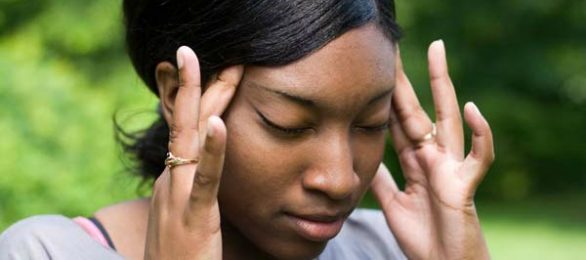When I heard people talking about postpartum depression (PPD) and the baby blues, it was just something I brushed off because I felt like it was something that other women went through. I always looked forward to being a mother, had a loving and supportive husband, and had it all planned out. But by the time our third child was born, I started to realize that no one was exempt from baby blues or PPD…not even myself. I didn’t realize that my daughter’s two hospital stays within her first month of life (four days for jaundice, and a separate five days for a blood transfusion), would have as great an impact on my mental health as it did.
It was months before I admitted, even to my husband, that things just weren’t quite right. I now realize that I was like a lot of other moms in that I was embarrassed about feeling hopeless, overly exhausted and disinterested. I’m so thankful that my case of the baby blues didn’t take a severe turn for the worse. I know that there are women, like Quiana Wade that I interviewed for this article, that go through a severe case of PPD. Here is what she had to say about her experience and what she wishes she would’ve done earlier on.
How did you recognize the signs of PPD?
Well I had a history of depression but had never really gotten help for it, so I knew I was more at risk at developing PPD. I just wasn’t myself. I was extremely tired (which a lot of new moms are). But it was to the point that I just couldn’t get out of bed. I was feeling inadequate and didn’t have that connection with my son that I did when I first had him in the hospital. That feeling went on for a few months so that’s when I knew it was more than just the baby blues. The hardest part was feeling like I was never going to get better. I didn’t feel any of the joy that I was supposed to feel as a new mother. I couldn’t snap out of the way I was feeling: so disconnected from him. I just felt so inadequate and that everyone else (like my mother and my husband) could take care of him way better than I could. I felt like I didn’t need to be around in order for him to be okay.
What were some of the initial steps you took to seek treatment once you knew you needed help?
I waited a really long time before I decided to get help. I just thought that I could handle it and that the feelings I was having would just go away. I found a psychologist through my job and she advised that I go to the ER for an evaluation because I was really bad by that point. I was hysterically crying and couldn’t stop. The support group at the hospital is honestly what started me on my path to getting better. In addition to joining group therapy, I also started seeing a psychologist for individual therapy. The combination of the two helped me get back on track.
How did PPD affect your marriage? How was your husband able to support you during this time?
It affected my marriage basically by strengthening our partnership. I was so unable to function at the time. There were a lot of irrational thoughts going on, and feelings of inadequacy didn’t go away. My husband is definitely an angel sent from heaven. He really is. He would go to work all day and then come home and tend to me and the baby. He would encourage me to just go lay down or go take a bath and just relax. We already had a good marriage before our son was born, but it made me specifically realize that I didn’t have to do it all. I was able to learn to lean on my husband and he liked to be leaned on.
What advice do you have for moms who think they may be suffering from PPD?
I grew up with a mom who had to do it all, so I had the mindset of, ‘Oh this is just what a mom does’. I put a lot of pressure on myself in that I felt like I should be able to do it because my mom did it by herself. Especially as a black woman, I felt that I should’ve felt stronger than what I was actually feeling. But what really showed my strength was going to get help.
Now that I’m on the other side of it, I’ll tell you what I should’ve done. I should’ve gone to get help much sooner than I did. There was no need to suffer for seven months when there is help out there. If anyone has any history of mental illness, they should definitely let their doctor know about that because then they can tell you what warning signs to look for. But just know that those feelings won’t last forever as I thought they would. Once I grasped the belief that things would get better, it allowed me to be able to start to enjoy motherhood. I had to learn that in order for me to take care of my son, I had to learn how to take care of myself first. Don’t be afraid or ashamed of telling someone that you need help.
I found great help and support from Postpartum Progress and Postpartum Support International.
